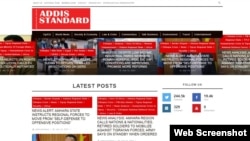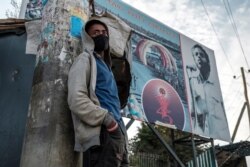Ethiopia's news website Addis Standard says it has been given approval by the government to resume operations this week after it was suspended over accusations it advanced the agenda of fighters in the war-torn northern Tigray region.
The English-language website and monthly magazine said Monday that the country's media regulator admitted legal missteps in revoking the outlet's license but reiterated that the news media must stop publishing specific references it says mischaracterize the Tigray region.
The Ethiopia Media Authority (EMA) has warned media outlets, including the Voice of America, not to refer to the Tigray People's Liberation Front (TPLF) as a national army by calling it the Tigray Defense Force or TDF.
Ethiopia's government has been battling the TPLF in the country's north since November, and in May it designated the group a terrorist organization. The TPLF is a former member of the coalition that ruled Ethiopia for more than 30 years.
Addis Standard said two senior members of its newsroom met Monday with officials from the EMA and said the outlet would get back its certificate of registration on Wednesday.
It said the EMA "recognized that its written notice cautioning media to refrain from such terminologies" about the TPLF was issued after the publications were already suspended and said in the future, proper means of notification would be followed.
The statement sent to VOA on Friday, signed by EMA agency chief Yonatan Tesfaye Regassa, said, "Bearing in mind that Tigray is one of the federation units of Ethiopia that cannot have a force with that nomenclature (such as 'Defense Force') and as the country's parliament has labeled TPLF a terrorist organization, the (EMA hereby) informs that use of such terminology violates Ethiopia's territorial integrity, national interest and security."
Warning all foreign media against "using such characterization," the statement said, "further use of the same terminology by any foreign media will be a grave violation of Ethiopian law, which will lead to stringent measures."
Director General of the Ethiopian Media Authority Mohammed Idris said in an interview with VOA that the government could revoke the licenses of media outlets that violate the new policy.
"When you compare them (the foreign media) with the local media, you see them using these terms without any reservation. In some cases, surprisingly, even individuals who are not in the media use the terms or endorse them," he said.
"We have notified the foreign media that it is inappropriate to act in such a way and they should refrain from using them. The local media also have been notified to be careful when they use these terms or bear the consequences. The consequences, as it is enshrined in the law, could go up to revocation of their registration."
The suspension last week of Addis Standard drew outrage from global press freedom watchdogs who have accused the government of Prime Minister Abiy Ahmed of taking an increasingly hard line against domestic news outlets covering the conflict.
When Ahmed came to power in 2018, it appeared that Ethiopia would shake off its reputation as having a repressive media environment, but conditions for journalists have worsened in the face of new political challenges, according to reports by multiple press freedom advocates.













